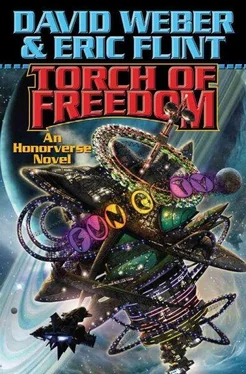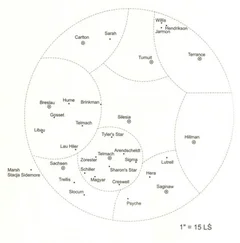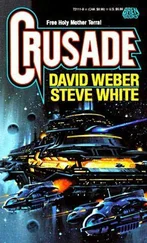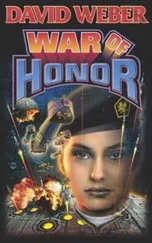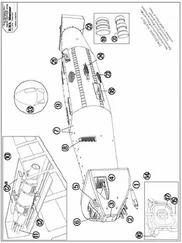Collin Detweiler's tower was far enough from ground zero to be well outside the fireball. Moreover, the interior walls protected him from the effects of radiation as well as keeping the fires in the outer apartments from spreading into the inner corridors and elevator shafts.
So, he was still alive when the rescue teams arrived. Battered into a pulp by the effects of the blast, with multiple broken bones and contusions and lacerations seemingly covering his entire body. Barely alive, but alive—and given modern emergency medical techniques, that was enough to ensure his survival.
* * *
"You did WHAT ?" shrieked Andrew Artlett, less than two minutes after the shuttle began disgorging its contents in one of the cargo bays of the Hali Sowle.
* * *
"There goes another one, E.D. What do you want me to do?"
Helplessly, Trimm stared at the screen. Yet another ship was leaving orbit. That was hardly unusual, in and of itself, given the traffic that came in and out of the Mesan system. But there were now at least twice as many ships leaving as there normally would have been.
Whatever had happened down on the surface of the planet to have caused this chaos, it had obviously spooked a lot of ship captains.
She still had no idea which ship was which. But—for once—that jackass Blomqvist had proved to be useful. His jury-rigged system for gauging ship tonnages seemed to be working pretty well. So at least E.D. could separate the big boys from the flotsam and jetsam.
"What's their mass?"
He studied the screen for a few seconds. "I make it about a million tons. Give or take a quarter of a million, you understand."
Trimm waved her hand. "Doesn't matter. It's a small fry. No point in worrying about it with everything else on our plate. I'm not sending out what few pinnaces we have available to check anything smaller than four million tons."
* * *
Less than an hour after they made their upward alpha translation, Andrew Artlett was completely and totally vindicated.
Mainly because they'd just made an unscheduled—and most unpleasant— downward translation.
"Congratulations, you stupid goofballs. The hyper generator is now officially defunct. We're damned lucky it lasted long enough for the failsafes to throw us back into n-space before the stabilizer went. Of course, that was all the good luck we got issued. You may have noticed that the damned rotor shaft is snapped? Not warped, not bent, not deformes— snapped? Which doesn't even mention the collateral damage the thing did when it went! And—thanks to a pair of frigging cowboys I could name—the parts we need to fix it are in a garbage bin somewhere down on the surface of Mesa! "
His volume had risen steadily through the course of his explanation. That might have had something to do with how long he'd spent throwing up after the violent nausea of the totally unexpected crash translation. Or, of course, it might have stemmed from some other concern, Brice supposed.
Most likely not, though.
Victor Cachat didn't seem disturbed, however. Neither did Anton Zilwicki.
"Trust us, will you, Andrew?" Victor said. "Nothing that can happen to us now is remotely as bad as what would have happened had we not gotten off Mesa in time."
Andrew was still glaring. "It's going to take months to get that generator working again!"
Zilwicki shrugged. "I admit that's unfortunate—but mostly because I'm worried what's going to happen before we can finally get our news back home. Just drifting in space for a few months by itself—we've got power, right? Plenty of food and water, too—is no big deal. That's why they invented chess and card games and such."
* * *
Andrew didn't stay mad for long. He was no stranger to hard and tedious labor and a damn good card player. But what overrode all those issues was that if Zilwicki and Cachat hadn't dumped the spare parts a certain Steph Turner wouldn't be on board the ship.
Given the right circumstances—especially the right company—there was actually a lot to be said in favor of drifting through space for months.
* * *
Brice would certainly have agreed with that proposition. He'd been worried, at first, that he'd have to engage in a constant emotional wrestling match with Ed and James. But within two days, Nancy somehow made it clear that if she was going to get interested in any of them, it was going to be Brice. At that point, being reasonably good sports and excellent friends, Ed and James stepped aside.
Why did she have that preference? Brice had no idea. Maybe girls climbing into crates got imprinted like ducks climbing out of eggs. At the age of ten, he'd understood girls just fine. Five years later, everything about them was a mystery.
"Alpha translation in twelve minutes, Citizen Commodore," Citizen Commander Hartman reported.
"Thank you, Millicent," Citizen Commodore Adrian Luff said with deliberate calm. He glanced around the flag bridge of his new flagship, inhaled a deep, unobtrusive breath of satisfaction at the disciplined efficiency of his personnel, and then looked at the "adviser" standing courteously beside his command chair.
Captain Maddock looked like his own calm, professional self—despite what Luff had always thought of as the truly ridiculous uniform of the Mesa System Navy. There were times Luff was actually tempted to like Maddock, but the moments were few and far between. However courteous the Mesan might be, and Luff was willing to admit the captain took pains to be as courteous as possible, no officer of the People's Navy in Exile could ever forget what Maddock really represented.
Their keeper. Their paymasters' agent. The "technical adviser" whose real function was to make certain the PNE was prepared to do exactly what it was told, when it was told to, and where it was told to do it. And the fact that their paymasters were something as loathsome as Manpower only made what he symbolized even worse. The Mesan captain was the living reminder of every single nasty little accommodation Luff had been forced to make, all of the sordid lengths to which he and his people had been forced to go in their crusade to maintain something which could someday hope to oppose the counterrevolutionaries who had toppled the People's Republic.
There were times, especially late at night, when he found it difficult to sleep, when Adrian Luff had found himself wondering if that "someday" would ever come. Now he knew it would. Although no one—including himself—would have argued for a moment that the odds weren't still enormously against the PNE's ultimate victory (or even its survival), at least they had a chance now. However poor and tattered it might be, it was a chance , and he told himself—again—fiercely that buying that chance was worth even what they were about to do at Manpower's orders.
He glanced at the master plot whose icons showed the ships of his fleet, translating steadily down the alpha bands as they rode one of hyper-space's gravity waves towards the normal-space wall. There were more—lots more—of those icons than there had been, including a solid core of battlecruisers. The ten ex- Indefatigables were smaller than the four Warlord-C -class ships, like his own Bernard Montgomery , which had remained loyal to the Revolution, and they were woefully underprovided—by Haven Quadrant standards, at least—with active antimissile defenses. But he had to admit that their basic electronics fit was better than anything the People's Republic had ever had, even though the software driving those electronics had required considerable tweaking. And they had a healthy number of broadside tubes, although the standard Solarian anti-ship missiles, frankly, were pieces of junk.
Читать дальше
